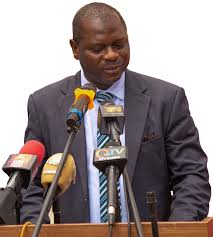Ebrima S. Jallow
The Minister of Finance and Economic Affairs, Honourable Seedy K.M. Keita on Thurday 28th July, 2022 tabled before the National Assembly a Revised Budget for 2022 as per the provisions of Section 30(1) of the Public Finance Act of 2014. The Act states that “The Minister may submit a Revised Budget to the National Assembly with any changes on revenues and expenditures that may be required, within the limit of the total appropriated amount of expenditures in any particular financial year”. This proposed budget is reflective of the current economic realities and consistent with a stable macroeconomic framework.
The submission of this revised budget was premised on the following ground, downward revision of total revenues amounting to D3.3 billion (11% reduction of the approved 2022 budget) , reduction of expenditure of D1.2 billion from domestic debt service and cuts from MDAs (3.4% of the approved Budget), The funding of the salary increment amounting to D575 million.
The 2022 Revised Budget includes 30% salary-increment for civil servants with effect from July 2022.The estimated increment is expected to generate a personal income tax of D222.5 million in the remaining six months of the year.
Minister Keita disclosed that the 30% basic salary increment only covers the civil servants (Ministries and Departments) as well as subvented hospitals and schools under the Ministry of Health and Ministry of Basic and Secondary Education.
He went on to explain that the general salary increments of 30% on basic salaries exclude pensioners due to a 100% increment of their pensions in 2018.
Minister Keita mentioned that the funding of salary increment amounting to D575 million and the creation of two new ministries (Ministry of Communication and Digital Economy and the Ministry of Public Service, Administrative Reforms, Policy Coordination and Delivery) also necessitated the revision of the approved 2022 budget to accommodate these changes.
He stated that the global economic shocks resulted in the non-realization of more than 11% of the revenue budget. ‘’To ameliorate that,’’ he said, “the government decided to reduce other charges and interest on domestic debt to contain the impact of the revenue reduction and to be able to accommodate the increase in salary of the civil service and a revised remuneration package for cabinet members’’.
He said overall, it has increased the personnel cost by D575.8 million. He added that the increase is applicable to certain public institutions that use the civil service Integrated Pay Scale.
He explained that to finance this salary increment, government decided to embark on expenditure cuts across MDAs. These cuts affected other expenditure by D76.3 million, capital expenditure by D116.3 million and debt Service by D415 million.
According to the finance minister, on revenues, there is general decline in revenues and grants, the continuous subsidy on petroleum products to the tune of nearly D1.0 billion for the first six months of the year affected the revenue performance for oil related products.
He also stated that budget supports grants has been revised downwards due to the non-materialization of budget support from the EU and AFDB for a combined amount of US$30 million (about D1.5billion.
The Minister added that the delinking of allowances from the basic salary will be carried out to further create an estimated fiscal space of D125million in the next six months of 2022 as well as freeze all committee allowances for internal meetings held within MDAs.
To create more fiscal space for the general expenditure revisions, a cut on the budget balances of Ministries was done to accommodate the salary revision. In addition, the groundnut subsidy for 2022 has been removed since groundnut prices are surging globally and therefore minimizing the need for the subsidy on groundnut.
Domestically Financed Capital Expenditure has also been reduced. This affects mainly non-performing capital projects. However, additional funding for road construction has been provided. This mainly covers roads such as Hakalang and North Bank roads Lot 1 and 2 and Kiang Sankandi.
The Honourable Minister concluded that the overall fiscal position will remain sound under the presented framework. All revenue shocks have been adjusted and domestic revenues are expected to finance government expenditure for the rest of the fiscal year. According to him, this will help provide greater predictability in the implementation of government programmes.
Finally, he appealed to the august assembly to approve the revised 2022 budget which is expected to improve the lives and livelihoods of civil servants in particular and Gambians in general within a stable and sound economic environment.







